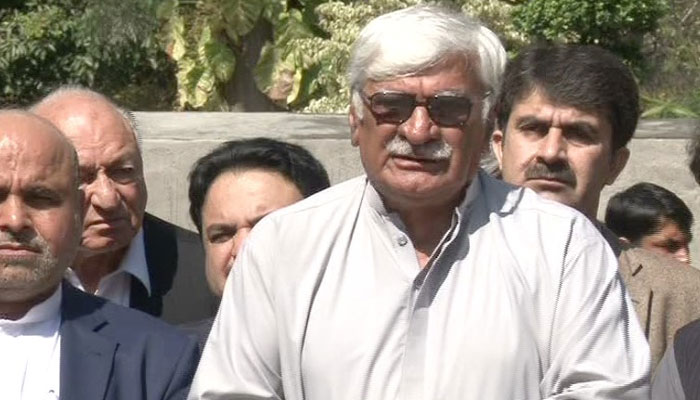The federal cabinet on Thursday approved the recommendations put forth by a reforms committee to bring the Federally Administered Tribal Areas (Fata) in the mainstream, Radio Pakistan
reported.
The cabinet had met in Islamabad with Prime Minister Nawaz Sharif in the chair.
Speaking at the meeting, PM Sharif had stressed the need to focus on underdeveloped areas with the aim to improve the living standards of people.
"The time has come that the tribal people will be brought into [the] mainstream to end their sense of deprivation," the reported quoted him as saying.
ARTICLE CONTINUES AFTER AD
The premier also said the people of Azad Kashmir, Gilgit Baltistan and Fata will be given their due share from national resources.
The approved recommendations
Later in the day, Adviser to Prime Minister on Foreign Affairs Sartaj Aziz shed light on the recommendations approved in the cabinet meeting.
He said the premier "approved in principle to the recommendations of the committee to mainstream Fata in five years in consultation with different stakeholders of the area".
Provisions will be made through a constitutional amendment to enable the people of Fata to elect their representatives to the Khyber Pakhtunkhwa Assembly in the 2018 elections, said Aziz.
The Frontier Crimes Regulation (FCR) will also be repealed and replaced by the new Riwaj Regulation for Tribal Areas, in which provisions related to collective responsibility will be omitted, thereby making an individual responsible only for his own acts.
He further said that the National Finance Commission would be requested to consider allocating 3% of the gross federal divisible pool on an annual basis for the implementation of the Fata Development Plan. This would be in addition to the existing allotment of Rs21 billion from the annual Public Sector Development Programme.
The recommendations also include the target date for repatriation of all IDPs, which is April 30 this year, while reconstruction activities in areas affected by military operations would also be completed by 2018.
The set of reforms were recommended by a six-member committee headed by Aziz.
For more details on the Fata reforms committee's initial recommendations, click here.
Political parties' support for the merger
The committee's report had earlier been removed at the eleventh hour from the agenda for the cabinet's Feb 7 meeting.
The decision had drawn strong criticism from supporters of the merger plan. Major political parties and Fata parliamentarians had announced a protest outside the Parliament on March 12 against the delay in approval of the committee's report.
The Jamaat-i-Islami (JI) had also staged a sit-in outside the Governor’s House in Peshawar on Feb 26. The protest was called off only after Governor Iqbal Zafar Jhagra had assured that the cabinet would approve the committee's report before March 12.
Besides JI, other parties — including the Awami National Party, Qaumi Watan Party, Pakistan Tehreek-i-Insaf and the PPP — had demanded the immediate merger of Fata with Khyber Pakhtunkhwa, the abolition of the Frontier Crimes Regulation (FCR), and the representation of tribes in the KP Assembly.
However, the JUI-F and the Pakhtunkhwa Milli Awami Party, another ally of the PML-N in the Centre, had opposed significant parts of the committee report, including the merger of Fata with KP.
JUI-F chief Maulana Fazlur Rehman had later claimed that he had reached an understanding with Prime Minister Sharif on Fata reforms. According to him, the word 'merger' would be replaced with the 'mainstreaming' of Fata.
https://www.dawn.com/news/1317961
ISLAMABAD: The recommendations to bring FATA at par with the rest of the country were approved at the Cabinet meeting on FATA reforms on Thursday.
According to sources, the recommendations will be presented in the Parliament.
At the meeting, it was decided the Federally Administered Tribal Areas (FATA) would be integrated with Khyber Pakhtunkhwa. The process will take five years as the law and order situation in the tribal areas is not favourable for major changes in the system.
Once FATA is made part of KP, the province's share in the National Finance Commission will increase, as 3% will be for the former.
While considering the additional allocation of funds for FATA, Prime Minister Nawaz Sharif stressed that all parts of Pakistan have equal rights on the resources of the country.
"Pakistan belongs to every Pakistani," he said. "Development of FATA is the responsibility of the entire nation and country."
Moreover, benches of the high court and Supreme Court will also be formed in the tribal areas.
To include tribespeople in the security services, 20,000 locals will be recruited in the levies force.
A 10-year plan will be made after which work will start on integrating Fata into KP, sources said.
It was also decided in the meeting that the Frontier Crime Regulation (FCR) will be repealed after a constitutional amendment.
The federal cabinet met under the chairpersonship of the prime minister.
Ministry of State and Frontier Region Secretary Shahzad briefed the cabinet on recommendations for the FATA Reforms Committee. Adviser to Prime Minister on Foreign Affairs Sartaj Aziz was also in attendance on the occasion.
Aziz, who heads the FATA reforms committee, said that to bring FATA into national fold, a five-year programme has been devised.
For security purposes in the region, levies officials will be hired, he added.
Move appreciated
After the meeting, Awami National Party President Asfandyar Wali Khan met media persons where he appreciated the Cabinet for taking up the report of the FATA Reforms Committee.
However, he expressed reservations over people from other provinces making decisions for FATA. Asfandyar said if parliamentarians from the Sindh Assembly can make decisions for Sindh and Baloch leaders can do the same for their provinces then why can FATA leaders not decide on the future of the tribal areas. "Why do policies for FATA come from outside?"
https://www.geo.tv/latest/132980-PM-chairs-meeting-of-federal-cabinet
@WAJsal @pakistani342
 With Fazal Diesel out of the way it looks like FATA merger is inevitable now?
With Fazal Diesel out of the way it looks like FATA merger is inevitable now?




